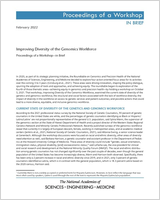Raising awareness. There is much work to be done to raise awareness of genetics and genomics careers among students, parents, educators, and counselors. High school and college students could be exposed to career options in genetics and genomics through in-person engagement and outreach. (Abdul-Rahman, Harrison, Mann, Reed)
Establishing holistic admissions processes.a Institutions can reevaluate the factors they consider in admissions decisions (e.g., the weight given to standardized test scores) and what constitutes a “competitive” applicant to a genetics training program in order to develop a more holistic and inclusive approach to admissions. (Abdul-Rahman, Harrison)
Creating internship and shadowing opportunities. Institutions could establish and provide internship and shadowing experiences for prospective applicants to genetic counseling programs and facilitate internships in other genetics and genomics fields through industry. (Harrison, Reed)
Fostering safe spaces. Institutions could ensure a safe, supportive environment for underrepresented students through the implementation of institutional policies, the employment of diverse faculty, training programs that include discussions, clear reporting guidelines and outcomes, and other activities that promote diversity, equity, inclusion, and justice. (Mann)
Providing mentorship. Mentors can support and guide students from diverse backgrounds in, for example, learning about careers in genetics and genomics, assembling competitive applications, and navigating training programs. Mentoring and networking can help retain practicing underrepresented genetic professionals and support their career development. (Abdul-Rahman, Harrison, Lee, Mann, Sol)
Reimagining educational pathways. Broadening both the roles for individuals in the genetics and genomics workforce (e.g., genetic counseling assistants) and the pathways for training and academic instruction (e.g., distance learning, combined degree programs) would create a novel pipeline that could lead to an increase in workforce diversity. Training could also be adapted to better develop untapped talent in communities and to prepare students to succeed in the workplace. Work with institutions where underrepresented students attend (such as historically Black colleges and universities) to create pipeline programs. (Abdul-Rahman, Archer, Harrison, Mann, Reed, Sol)
Influencing policy. Certified genetic counselors could be recognized as health care providers by Medicare so that they can be reimbursed for providing services. More appropriate reimbursement for all genetics professionals would positively affect salaries and would allow more rural hospitals to offer genetics services. Student loan forgiveness programs and funding for programs that support racial and ethnic minority participation were also suggested. (Abdul-Rahman, Ewing, Harrison, Lee, Mann, Reed)
Engaging industry. Developers and providers of genomic tools, technologies, services, and written materials could recognize the language and cultural needs of diverse patient populations and adapt their products accordingly in order to increase accessibility and inclusion. (Reed)
This list is the rapporteurs’ summary of points made by the individual speakers identified, and the statements have not been endorsed or verified by the National Academies of Sciences, Engineering, and Medicine. They are not intended to reflect a consensus among workshop participants.
